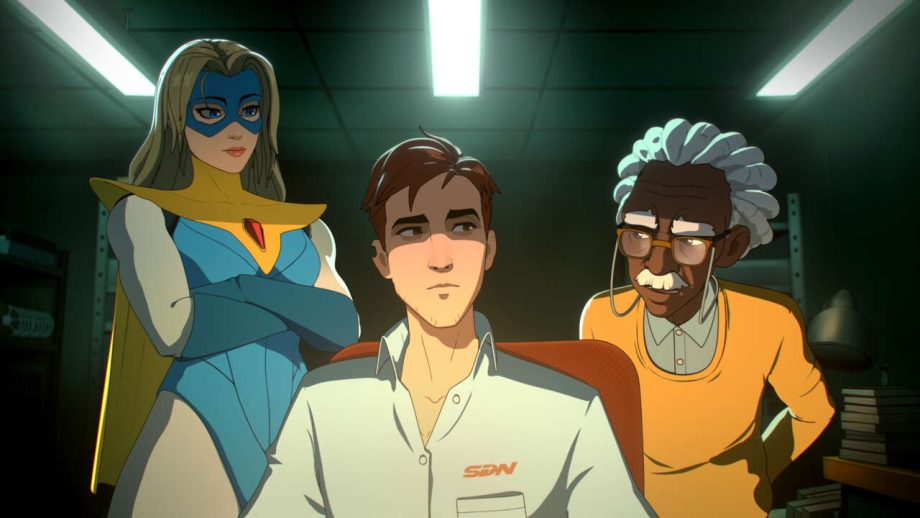Dispatch feels like it harkens back to the early 2010s–a time when Telltale Games was creating incredible episodic adventure games inspired by graphic novels, superhero stories were beginning to fill to the brim with quips to counterbalance the angst of the genre in the 2000s, and office-based TV comedies were everywhere. If not for snippets of gameplay, Dispatch would simply be a great TV show that I would want to tune into every week. It sometimes feels like it skews a little bit too much toward its TV show inspirations, but superb writing and voice acting maintains investment in this character-driven drama and makes for a story I want to replay.
In Dispatch, you play as Robert Robertson III, aka Mecha Man. Once a prominent hero without superpowers who had to rely on piloting a mechsuit to stop monstrous supervillains, Robert finds his life adrift after his suit is damaged beyond repair. He’s approached by Blonde Blazer, a famous hero-for-hire, who offers him a job as a dispatcher–someone who directs and assists a team of paid heroes. The catch: Robert’s assigned group of misfits is entirely composed of former supervillains, and their crass attitudes, explosive tempers, and lack of camaraderie make them a poor team and ill-suited for hero work.

It’s a stellar set-up, made even stronger by an incredible cast of varied characters. While trailers and advertisements offered an initial impression of Robert being your typical washed-up hero defined by dour sarcasm, the character is a remarkably refreshing take for a protagonist in a superhero story. Yes, he’s depressed and often uses humor to deflect, but he has an earnest desire to help people and continue being a force for good. He doesn’t view the supervillains under his command as a hindrance, but a mission: He’ll mentor the roster into a group of heroes even greater than he was because it’s best for the city and for the former villains’ lives.
A few characters joke about Robert being good at speeches, and I’d be inclined to agree. His words of encouragement are a strong motivation to take each assignment as seriously as possible, adding weight to both the story and the choices you make throughout it. The main gameplay loop of Dispatch sees Robert behind a computer screen, being alerted to crimes and calls for help across the city. It’s up to you to carefully read each request, which are all worded to specifically point to what a person is asking for, and react accordingly. A caller might be asking for help stopping a fight, but they specifically mention to not do so violently, for example, or a concerned citizen might reach out because they’ve found a bomb that needs diffusing and it’s going to go off soon so a responder needs to hurry.

Each wanna-be hero on Robert’s roster has an array of scores split across five stats: Combat, Vigor, Mobility, Charisma, and Intellect. Based on the language used for each crime, you have to decide which former villain would be the best option to send. The sword-wielding and portal-making half-demon Malevola is a bit of an all-rounder, for instance, while the winged assassin Coupé has good Combat, Mobility, and Intellect, but poor Vigor and Charisma. Rarely is a single hero the perfect choice for the job, and each mission carries with it a chance of failure that’s left up to luck. You can close the margin for error by sending more than one hero on an assignment, though–if a mission calls for a high-speed chase while holding off enemy fire, I might send both the highly mobile stealth hero Invisigal and damage-soaking bruiser Golem.
The trade-off for overpreparation is time and resources. Every hero you send off takes them out of the rotation for a while; first traveling to the assignment, then doing it, then traveling back to base, and finally, resting after the ordeal. You’ll usually have a dozen or so missions per shift, with two to four popping at a time, and each only remains on the board for a short period before timing out. This encourages you to be quick and strategic with your choices. Frontloading too many of the early assignments with numerous heroes to avoid failure means everyone will be out of commission and resting when the second batch of missions rolls in, causing them to end in failure. But if you don’t send enough heroes to begin with, you might fail anyway.


On occasion, a hero might ask Robert to intervene and provide a more hands-on approach as well. This often boils down to making a judgment call on how a hero should proceed when a complication arises–three to four options are typically presented, with each phrased in a certain way to hint at the skill needed to press ahead. Other times, however, Robert can use his experience as a tech-based hero to lend his hacking expertise and circumnavigate the problem.












